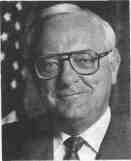Health agencies across Illinois reported a banner year in 1994 in donations of organs arid tissue for transplant following last summer's "Life Goes On" public awareness campaign conducted by my office. The million-dollar media effort publicized the urgent need for additional donors. As a result, the state's largest procurement agency — the Regional Organ Bank of Illinois in Chicago — reported a 20 percent increase in organ donations in 1994, making Illinois first in the nation for organ transplants. Sharp upturns in donations also were recorded by other procurement groups last year. Mid-America Transplant Services of St. Louis (serving 28 downstate Illinois counties) reported a 10 percent increase, while the Illinois Eye Bank of Chicago set a new record for cornea donations. These are very encouraging developments, and it shows what we believed all along — that education is our best hope for increasing the supply of donor organs and tissue. By spreading the word, we are making more organs and tissue available, and that means lives are being saved. For example: • "Baby Quinn" Kyles of Chicago recently celebrated the third anniversary of a life-saving heart transplant that made national headlines. • Eight people benefitted from Billy Davis's donation after he was killed in a train/car crash last June. Because he was pursuing a career in nuclear medical technology, his parents felt he would have wanted to be an organ donor. Their most rewarding moment since his death was receiving a grateful letter from the recipient of his lungs. • Clara Langford of Albion received cornea transplants in August 1993 and last September, and now can see clearly for the first time in many years. One of her donors was a young woman. • Jack Fassnacht, a young lawyer from Chicago, recently celebrated the fifth anniversary of his kidney transplant. Fassnacht considers the date of his operation his "birthday." Since the transplant, he has been in good health and recently celebrated the birth of a daughter. At last count, 1,825 people were waiting for transplant operations in Illinois, an increase of nearly 15 percent over 1993. The large majority — 1,327 — are waiting for donor kidneys. One person anxious for a donor is Jan Morgan of Chillicothe, who wears a beeper around the clock as she continues a yearlong wait for a double lung transplant. Suffering from a genetic form of emphysema, Morgan needs the transplant to survive. When one of her two teenagers, a 16-year-old daughter, recently received a drivers license, she not only signed up for the state's organ and tissue donor registry but urged others in her drivers education class to become potential donors. Anyone, regardless of age, race or gender, can be an organ and tissue donor. If a person is under age 18, he or she must have consent of a parent or legal guardian. Becoming a donor is easy. First, tell your family. Hospitals require next-of-kin consent before organ and tissue donation can occur. Then sign the back of your Illinois drivers license or ID card with a ballpoint pen. Sign directly on the plastic and have your signature witnessed and signed by two people, preferably family members. Finally, participate in the organ and tissue donor registry when you visit a Driver Services facility. My "Life Goes On" effort is funded through my 1993 "Live & Learn" initiative, which generates about $2 million annually to educate the public about the critical need for additional organ and tissue donations. The effects of the 1994 media campaign were seen statewide, with sharp increases in donations noted by the American Red Cross Tissue Services of Peoria and the Bro-Menn Watson-Gailey Eye Bank in Bloomington. Additionally, my office continues to see a sharp increase in the number of drivers license applicants registering as potential organ and tissue donors. In 1994, 36 percent of all applicants agreed to be listed in the organ and tissue donor registry, a 60 percent increase over 1993. You also can be listed in the registry or ask any questions about organ and tissue donations by writing to the Secretary of State's office, Organ Donor Awareness Program, 2701 S. Dirksen Parkway, Springfield, IL 62723, or by calling 217/785-1444. Please think about organ and tissue donation. Your decision could give someone the gift of a lifetime. February 1995 / Illinois Municipal Review / Page 7.
|Home|
|Search|
|Back to Periodicals Available|
|Table of Contents|
|Back to Illinois Municipal Review 1995|
|
|||||||||||||||||

